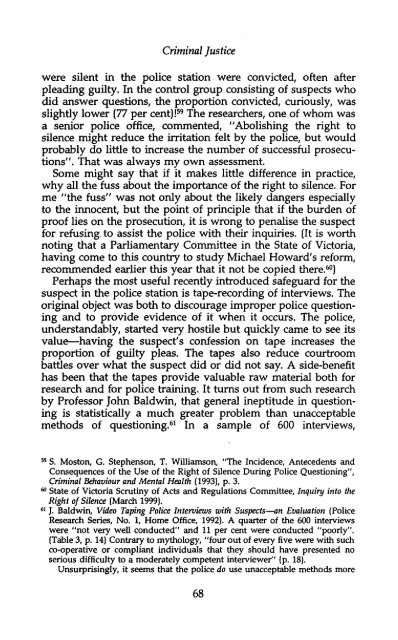HAMLYN - College of Social Sciences and International Studies ...
HAMLYN - College of Social Sciences and International Studies ...
HAMLYN - College of Social Sciences and International Studies ...
Create successful ePaper yourself
Turn your PDF publications into a flip-book with our unique Google optimized e-Paper software.
Criminal Justice<br />
were silent in the police station were convicted, <strong>of</strong>ten after<br />
pleading guilty. In the control group consisting <strong>of</strong> suspects who<br />
did answer questions, the proportion convicted, curiously, was<br />
slightly lower {77 per cent)! 59 The researchers, one <strong>of</strong> whom was<br />
a senior police <strong>of</strong>fice, commented, "Abolishing the right to<br />
silence might reduce the irritation felt by the police, but would<br />
probably do little to increase the number <strong>of</strong> successful prosecutions".<br />
That was always my own assessment.<br />
Some might say that if it makes little difference in practice,<br />
why all the fuss about the importance <strong>of</strong> the right to silence. For<br />
me "the fuss" was not only about the likely dangers especially<br />
to the innocent, but the point <strong>of</strong> principle that if the burden <strong>of</strong><br />
pro<strong>of</strong> lies on the prosecution, it is wrong to penalise the suspect<br />
for refusing to assist the police with their inquiries. (It is worth<br />
noting that a Parliamentary Committee in the State <strong>of</strong> Victoria,<br />
having come to this country to study Michael Howard's reform,<br />
recommended earlier this year that it not be copied there. 60 )<br />
Perhaps the most useful recently introduced safeguard for the<br />
suspect in the police station is tape-recording <strong>of</strong> interviews. The<br />
original object was both to discourage improper police questioning<br />
<strong>and</strong> to provide evidence <strong>of</strong> it when it occurs. The police,<br />
underst<strong>and</strong>ably, started very hostile but quickly came to see its<br />
value—having the suspect's confession on tape increases the<br />
proportion <strong>of</strong> guilty pleas. The tapes also reduce courtroom<br />
battles over what the suspect did or did not say. A side-benefit<br />
has been that the tapes provide valuable raw material both for<br />
research <strong>and</strong> for police training. It turns out from such research<br />
by Pr<strong>of</strong>essor John Baldwin, that general ineptitude in questioning<br />
is statistically a much greater problem than unacceptable<br />
methods <strong>of</strong> questioning. 61 In a sample <strong>of</strong> 600 interviews,<br />
59 S. Moston, G. Stephenson, T. Williamson, "The Incidence, Antecedents <strong>and</strong><br />
Consequences <strong>of</strong> the Use <strong>of</strong> the Right <strong>of</strong> Silence During Police Questioning",<br />
Criminal Behaviour <strong>and</strong> Mental Health (1993), p. 3.<br />
60 State <strong>of</strong> Victoria Scrutiny <strong>of</strong> Acts <strong>and</strong> Regulations Committee, Inquiry into the<br />
Right <strong>of</strong> Silence (March 1999).<br />
61 J. Baldwin, Video Taping Police Interviews with Suspects—an Evaluation (Police<br />
Research Series, No. 1, Home Office, 1992). A quarter <strong>of</strong> the 600 interviews<br />
were "not very well conducted" <strong>and</strong> 11 per cent were conducted "poorly".<br />
(Table 3, p. 14) Contrary to mythology, "four out <strong>of</strong> every five were with such<br />
co-operative or compliant individuals that they should have presented no<br />
serious difficulty to a moderately competent interviewer" (p. 18).<br />
Unsurprisingly, it seems that the police do use unacceptable methods more<br />
68

















